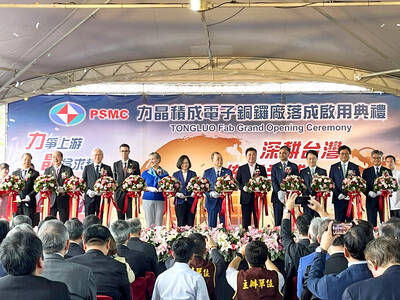Johannes Reck should be feeling pretty groovy. He is the cofounder of one of the hottest start-ups in Berlin. GetYourGuide lets holiday makers book tours online in 150 countries and is on course to increase ticket sales this year by 75 percent. In May, it raised US$484 million from investors and it is now valued at more than US$1 billion.
Reck’s company is precisely the type of unicorn European policymakers want to see more of as they champion entrepreneurship that can kick-start much-needed economic growth. However, he is fuming.
“It’s not even that I am disappointed — I am angry, really angry, because you don’t need to reinvent the wheel here,” said Reck, a 34-year-old German with the wiry build of a marathoner. “It’s not like we are asking politicians to do something unheard of.”

Photo: Reuters
The problem? Reck cannot provide his people with a stake in the future of their venture without incurring crushing costs and hassle.
For decades, tech mavens in the US have used stock options for employees to spur innovation — and unprecedented wealth. Unlike Silicon Valley, where equity incentive plans have become as ubiquitous as foosball tables and midday yoga sessions, the options culture has yet to take root in many European countries.
While some lawmakers are taking action to loosen restrictions on pay, it is going to be hard to close the gap when income inequality is becoming a more urgent issue on both sides of the Atlantic.
European consumers and lawmakers have long decried outsize paydays as unfair and vulgar. A few years ago, the Netherlands capped bonuses for bankers, money managers and other financial professionals at 20 percent of their base salaries.
Entrepreneurs must navigate onerous tax rates and restrictions that often make equity sharing and options more trouble than they are worth.
When employees in Germany exercise options, they have to pay income tax on the difference between the fair market value and the strike price, and that rate runs from 14 to 47.5 percent. They also have to pay a 25 percent capital-gains tax on additional profits when they sell their shares.
In contrast, US employees typically pay a 0 to 20 percent rate on capital gains when options are redeemed, though they might have to pay additional levies when they are exercised, depending on the timing and the type of equity incentive program.
Germany and 14 other countries, including Sweden and the Netherlands, are more burdensome than the US regarding options, according to a study last year by Index Ventures, a venture capital firm in London and Silicon Valley.
For entrepreneurs and venture capitalists, the problem is not just about attracting top talent. The compensation bind might also be a big reason why Europe does not produce world-beating tech companies at the same level as the US.
Other forces are at work, too. Even though they are part of the EU, member states remain a fragmented collection of markets that cannot muster the borderless scale achieved in the US. Plus, there is the widely shared belief that European business culture simply does not tolerate the experimentation and inevitable failures that are par for the course in, say, Silicon Valley.
While governments across the EU have devoted hundreds of millions of euros to venture capital-style programs to invest in start-ups, the one tool entrepreneurs truly want remains out of reach.
“There are two ingredients to growth in a start-up,” Index Ventures partner Martin Mignot said. “One is capital and the other is talent, and when you’re not highly profitable you have to incentivize employees on the promise of the upside. Your currency is that promise.”
Spotify Technology SA, Klarna Bank AB, and TransferWise lead a roster of European companies that have shaken up industries with new products and created wealth for their investors and employees. Likewise, a handful of countries hew to the US approach on compensation; the UK, Italy, Portugal, and, interestingly enough, France, tax options as capital gains when they are cashed in.
Yet they are the exceptions. In many other European markets, start-up founders have to use various workarounds to vest employees in their businesses. In Sweden, options can be taxed as income at rates of more than 50 percent.
Klarna, a digital payments firm, sidesteps the bill by issuing warrants priced at fair market value using the Black-Scholes model, which are taxed as capital gains at 25 to 30 percent at the time of sale.
However, as incentives, fully priced warrants are not as potent as cheaper priced options, Klarna chief operating officer Knut Frangsmyr said.
Companies in Austria, the Czech Republic, Germany and Spain distribute “virtual share options,” but the instruments are really just cash bonuses by another name and might not deliver the windfalls that bona fide options do when a company is acquired or holds an initial public offering.
In Germany, at least, help might finally be on the way. Bettina Stark-Watzinger, chairwoman of the Finance Committee in the Bundestag, has crafted legislation that would cut the tax rate on stock options in half by treating them as capital gains instead of income.
Stark-Watzinger, a member of the centrist opposition Free Democratic Party, has argued that Germany has become complacent about supporting digital innovation.
She is worried that promising tech companies will decamp to other countries if lawmakers do not change things.
“We are so preoccupied with the economy of the last century,” Stark-Watzinger said in her office suite near Berlin’s iconic Brandenburg Gate. “We are so proud of our trade surplus and our automobile industry, but we have fallen behind in the digital economy. This is where value and growth will come from in the future.”
It would not be easy for Stark-Watzinger to persuade parties in Germany’s governing coalition to embrace legislation that might be seen as favoring workers in the relatively well-off tech sector.
Reck, for one, was relieved the issue is finally on the agenda.
Birgit Jennen contributed to this report

ARTIFICIAL INTELLIGENCE: The chipmaker last month raised its capital spending by 28 percent for this year to NT$32 billion from a previous estimate of NT$25 billion Contract chipmaker Powerchip Semiconductor Manufacturing Corp (力積電子) yesterday launched a new 12-inch fab, tapping into advanced chip-on-wafer-on-substrate (CoWoS) packaging technology to support rising demand for artificial intelligence (AI) devices. Powerchip is to offer interposers, one of three parts in CoWoS packaging technology, with shipments scheduled for the second half of this year, Powerchip chairman Frank Huang (黃崇仁) told reporters on the sidelines of a fab inauguration ceremony in the Tongluo Science Park (銅鑼科學園區) in Miaoli County yesterday. “We are working with customers to supply CoWoS-related business, utilizing part of this new fab’s capacity,” Huang said, adding that Powerchip intended to bridge

Microsoft Corp yesterday said that it would create Thailand’s first data center region to boost cloud and artificial intelligence (AI) infrastructure, promising AI training to more than 100,000 people to develop tech. Bangkok is a key economic player in Southeast Asia, but it has lagged behind Indonesia and Singapore when it comes to the tech industry. Thailand has an “incredible opportunity to build a digital-first, AI-powered future,” Microsoft chairman and chief executive officer Satya Nadella said at an event in Bangkok. Data center regions are physical locations that store computing infrastructure, allowing secure and reliable access to cloud platforms. The global embrace of AI

RIDING AI WAVE: : Most of its NT$15bn capital budget would be spent on packaging technologies used in AI and HPC chips and advanced testing technology, it said Chip testing and packaging service provider Powertech Technology Inc (PTI, 力成科技) plans to increase this year’s capital expenditure by 50 percent to expand capacity to meet growing demand for advanced memorychips used in artificial intelligence (AI) products. The company proposed to spend NT$15 billion (US$460.94 million) to expand advanced capacity and equipment, compared with a budget of NT$10 billion it planned three months ago. “We are seeing a recovery in market demand as well as new business opportunities. We will spend heavily on advanced packaging” equipment, Powertech chief executive officer Boris Hsieh (謝永達) told investors on Tuesday. “We will focus on ramping

INFLATION WATCH: A rate hike in March would help keep inflation at 2.16 percent this year, although a weak currency and higher electricity rates are an issue, S&P said Moody’s Ratings and S&P Global Ratings have reaffirmed Taiwan’s sovereign credit ratings at “As3” and “AA+” respectively with a stable outlook on the back of high income and wealth levels, a strong institutional framework and robust external positions. The affirmations came as Taiwan’s economy is gaining momentum after quarters of slowdown induced by stubborn global inflation and monetary tightening. Taiwan’s strong fiscal and external buffers have improved relative to peers as evidenced by recent shocks linked to the COVID-19 pandemic and the ongoing US-China technology dispute, the two ratings firms said. “Taiwan stands as the epicenter of the global semiconductor supply chain, accounting